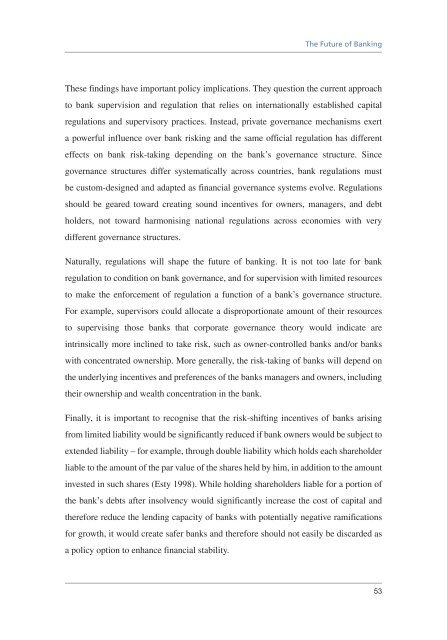You also want an ePaper? Increase the reach of your titles
YUMPU automatically turns print PDFs into web optimized ePapers that Google loves.
The Future of Banking<br />
These findings have important policy implications. They question the current approach<br />
to bank supervision and regulation that relies on internationally established capital<br />
regulations and supervisory practices. Instead, private governance mechanisms exert<br />
a powerful influence over bank risking and the same official regulation has different<br />
effects on bank risk-taking depending on the bank’s governance structure. Since<br />
governance structures differ systematically across countries, bank regulations must<br />
be custom-designed and adapted as financial governance systems evolve. Regulations<br />
should be geared toward creating sound incentives for owners, managers, and debt<br />
holders, not toward harmonising national regulations across economies with very<br />
different governance structures.<br />
Naturally, regulations will shape the future of banking. It is not too late for bank<br />
regulation to condition on bank governance, and for supervision with limited resources<br />
to make the enforcement of regulation a function of a bank’s governance structure.<br />
For example, supervisors could allocate a disproportionate amount of their resources<br />
to supervising those banks that corporate governance theory would indicate are<br />
intrinsically more inclined to take risk, such as owner-controlled banks and/or banks<br />
with concentrated ownership. More generally, the risk-taking of banks will depend on<br />
the underlying incentives and preferences of the banks managers and owners, including<br />
their ownership and wealth concentration in the bank.<br />
Finally, it is important to recognise that the risk-shifting incentives of banks arising<br />
from limited liability would be significantly reduced if bank owners would be subject to<br />
extended liability – for example, through double liability which holds each shareholder<br />
liable to the amount of the par value of the shares held <strong>by</strong> him, in addition to the amount<br />
invested in such shares (Esty 1998). While holding shareholders liable for a portion of<br />
the bank’s debts after insolvency would significantly increase the cost of capital and<br />
therefore reduce the lending capacity of banks with potentially negative ramifications<br />
for growth, it would create safer banks and therefore should not easily be discarded as<br />
a policy option to enhance financial stability.<br />
53














